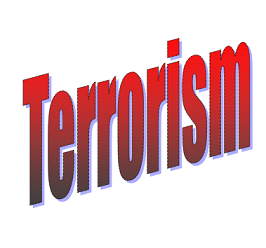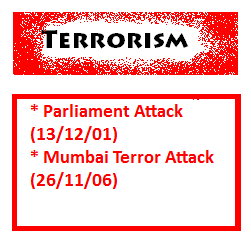Terrorism and India : An Examination after Afzal Guru’s Execution
Afzal Guru is hanged for his role in the infamous Parliament Terrorist Attack case which caused the death of nine persons on 26th Dec 2001. The hanging should be read in context of India’s image as a country with low execution rates of terrorists, and Ajmal Kasab’s execution three months back.
India and terrorism
Terrorism is the philosophy of creating terror often targeting civilians (non-military citizens) for achieving religious, political or ideological goals. The definition of reign of terror or its boundaries are subjective, but the India like almost all modern nations, is a target of terrorism – both from outside and within.

India and Terrorism
Apart from Jammu and Kashmir, almost all major cities of India – Delhi, Mumbai and Bangalore had seen terrorist attack aimed at creating fear among people by killing innocent citizens. The seven sister states of north east India is also infamous for terrorism. While the demands of most of the terrorist groups is separation from main land, these groups are backed by foreign countries for their violent tactics. Religious and cultural extremism practiced by different groups, and the violent means they adopt to achieve their ideals or target forms the basis for internal terrorism.
Gandhi, Indira and Rajiv – Victims of Terrorism
Father of our nation was shot dead by a religious fanatic in 1948, former primer minister Indira Gandhi by her own Sikh body guards in 1984, and Rajiv Gandhi in 1991 by suicide bombing done by LTTE.
India – How secure are common citizens?
We might have Inter-Ballistic Continental Missiles and nuclear capabilities but a land of 121 crore people is never easy to protect, particularly if the attack is away from the border targeted at isolated non-military citizens. Thousands of innocent people had lost their lives in terrorism related incidents. Around 35 terrorist organizations are banned by Indian Government, but terrorism is not yet uprooted from Indian Soil.
Major Terrorist Organization in India (Banned)
Among the 35 banned terrorist groups, those involved in the last major terror incidents are the following.

Terrorism
- Lashkar-e-Taiba/Pasban-e-Ahle Hadis — Mumbai Attack(2006)
- Jaish-e-Mohammad/Tahrik-e-Furqan — Parliament Attack(2001)
- Indian Mujahideen
- United Liberation Front of Assam (ULFA)
- Communist Party of India (Maoist)
- Al-Qaida
- Liberation Tigers of Tamil Eelam (LTTE)
- People’s Liberation Army (PLA)
- Jammu and Kashmir Islamic Front
- Hizb-ul-Mujahideen/ Hizb-ul-Mujahideen Pir Panjal Regiment
Anti Terrorism Laws In India
- Terrorist and Disruptive Activities Act (T.A.D.A.) – Lapsed in 1995
- Prevention of Terrorist Activities (P.O.T.A.) – repealed in 2004
- Unlawful Activities Prevention Act (U.A.P.A.) – amended and active.
Low terror conviction and execution rate : Leave the cases of Afzal Guru and Ajmal Kasab, the last executions for terrorism were the hangings of Sukhdev Singh Sukha and Harjinder Singh Jinda in 1992 and Maqbool Bhatt in 1984. Satwant Singh and Kehar Singh, who were convicted and hanged for their roles in the assassination of Prime Minister Indira Gandhi (1989) can also be read along this. But the list ends here.
Why terrorists are not hanged even after conviction?
The hanging of terrorists in India is a very political business. The primary reason for delay even after death sentence verdict from Supreme Court is the vote bank politics. If the convict is a Sikh, that will affect Sikh vote bank, if the convict is a Muslim, that will affect Muslim vote-bank, if the convict is a Tamil that will affect Tamil vote bank ; hence politicians will sit on the top of these files years waiting for an ideal time to carry out the death sentence. Having taken two frequent decisions, Government is giving a message that things are going to change and they are going to give anti-terrorist measure priority over vote bank politics.